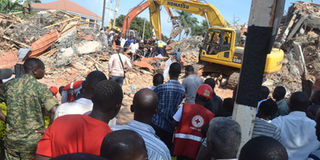Rethink our disaster preparedness

The collapsed building in Jinja Town has further exposed the inability of our authorities to handle emergencies however small they could be.
It is also hard to tell whether it is lack of will, capacity or expertise to handle disasters that could be the cause for the slow, uncoordinated and inappropriate responses that lead to the loss of lives.
Unlike the rain triggered widespread disasters that occurred towards the end of 2019, cutting off access routes and damaging communication lines in the affected areas making it hard to respond in good time, the Jinja incident happened in the municipal centre where any kind of machinery could have easily been deployed to open the rubble and save the wailing souls.
With earlier estimates that more than 30 people had been trapped in the rubble, it was worthwhile to deploy a well-equipped expert rescue team from the national disaster coordination and response centre at the scene as opposed to armed officers that were protecting the pieces of iron from vandalism.
However, this is just one of the many incidents for which our capacity as a country to respond to disaster whether natural has been seen as lacking. The department of relief, disaster preparedness and refugees has not lived to their establishment.
Despite the very good and comprehensive policy for disaster preparedness and management, a lot still needs to be done so as to achieve commendable levels of timely and appropriate response to disaster.
Adherence to the policy framework will help bridge the funding gap if the proposed 1.5 per cent proportion of the national budget is allocated accordingly and used to purchase the necessary equipment, skill manpower and also reinforce the local disaster management committees in the different regions, according to the level and nature of disaster exposure.
There is also need to reduce the monopoly of police and the other forces in responding to emergencies by attracting and encouraging private investment into emergency response and rescue services provision.
As well, massive sensitisation of nationals about basic ways of increasing chances of survival for self and others in case of an occurrence for a range of disasters.
Most important to note is that with the increasing population and economic activity, the frequency and impact of human made disaster is bound to increase and it’s therefore prudent that we adjust our perception and preparedness to handle disaster from natural to man made.
Daniel Kabire
Insurance expert




